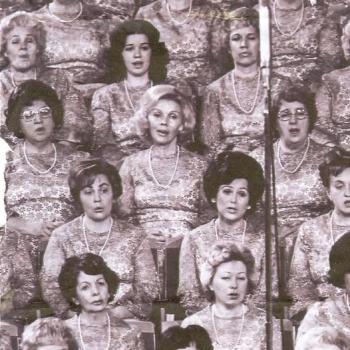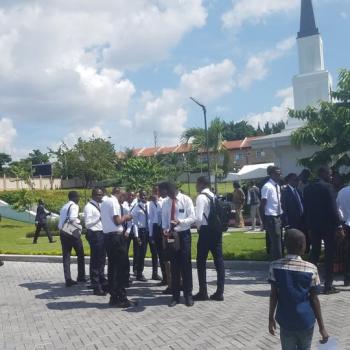When my family moved to Utah from Illinois, I spent the last month of fourth grade at Wasatch Elementary. Two days after I arrived, nobody would talk to me. Finally, a classmate who was also in my primary class gave me a two-page list of my faults, explaining my unworthiness to associate with the others. First on the list was this: “You have red hair.” True. I could not deny it. Second: “You show off.” Also true. I did cartwheels during recess.
I became a loner instantly and played hop scotch by myself. But a week later, a thin little girl, also in my class, came up to me as I played. “Hi,” she said. “Do you want to be best friends?” I nodded.
Her name was Jackie Selck. She tossed the taw and it landed on a line. “Damn,” she said. Now I was in a real quandary. My best friend swore. I would have to ask my mother if it was okay for me to have a best friend who swore.

Mom decided it would be okay.
Jackie and I were best friends for several years. We weren’t so close in high school, but some twenty years after graduation, she called me and asked me to lunch. She said, “You might hear something, and I want you to hear it from me first.” Over cornbread and soup, she told me that she had terminal cancer. I remember fighting the tears and managing finally, “I just want you to know—thank you for being my friend.” I went home with her—her own home now, not the one she was raised in. She showed me her projects. She was embroidering temple aprons for her children. They would receive her gifts long after she was gone.
I attended the funeral with my mother, and saw Jackie’s own little girl, looking much like Jackie when she first approached me on the playground. Jackie had lost her own mother to breast cancer the year before I met her.
As I look at the past week of exchanges about Mormon feminism and the attacking comments, along with my own lashing back, I remember Jackie, who was my friend when nobody else was. I wonder how I would have gotten through fifth grade without her. And I was her friend—her only one at the time. I hope I would have stood up for her. She was being raised by two maiden aunts who drove her to school at ten mph. Her father smoked. I was dealing with my own self-doubts so much that I wasn’t aware of her burdens, but I do remember her showing me a picture of her mother in a satin wedding dress. That was as close as I got to Jackie’s grief.
I find myself ashamed at thoughtless comments I made to women who are, after all, my sisters. (I consider all women my sisters.) I want to create a safe place for conversation where we are friends first and forever. All of us have had losses, and we all need someone to show up with the words, “Do you want to be friends?” Part of humanity is forming communities. Another part is negotiating our borders. Who do we keep out? Who do we let in? How do we define ourselves? How do we define others?
I talked to one of my biological sisters, who has been a relief society president, and asked her how she would answer a woman making a plaintive declaration: “I don’t understand why women don’t hold the priesthood.”
My sister said her response would be, “Thank you for saying that so honestly. I can tell it it really matters to you. It’s a complex issue.” Of course, we can’t turn a RS meeting into a debate, but surely a lunch with room for talk would work. Not a good idea to set up study groups talking about the issue, but surely resources can be provided.
Immediately off the table must be the dismissive answers: “We don’t need it like men do.” “I do hold the priesthood—I hold it every night when I go to sleep with my husband.” Lindsay Hansen Park gives common responses to women agitating for priesthood ordination here. All of those answers would give the same message: “You don’t belong here.” That’s the last thing we want to communicate. (And I communicated that myself in a moment of frustration. After reading a rather ugly description of the church, I said, “What a dismal description. Why would you even stay?” It was taken to mean, “Why don’t you leave?” I accept responsibility for not looking at my words carefully before publishing them. Murphy’s rule of writing is this: If it’s possible to be misunderstood, you will be. So all writers, commenters, and respondents must accept responsibility to not send any message which could be hurtful and to not willfully misinterpret what another has said. Violation of either rule results inevitably in discord. Also, beware of trolls who will purposefully misinterpret to sow chaos and contention.)
Now, for the other side. How can those who support the Ordain Movement be more inclusive in their dialogue? I can speak only for myself, but I know that I have a place in Mormon feminism, and that it should be honored. I believe every woman can contribute something to a vision which most could support.
I do have some questions. I wonder if the Ordain Women movement wants the Melchizedek priesthood or the Aaronic or both. I wonder if it’s possible that there is another priesthood for women. The priesthood is rightly called “The holy priesthood after the order of the son of God.” The name Melchizedek means “King of Righteousness.” Tzadik (Zedik), as lovers of Potok’s work know, means “Righteous[ness].” Regardless of who is ordained, the power and authority of the priesthood are based on righteousness.
I think there may be particular duties which are divided by gender. When reformed Jews started letting women participate in some rituals involving the Torah, orthodox Jews were deeply offended, because the Torah was considered masculine, even phallic. For some, it was blasphemy for a woman to handle it. Certainly such sensibilities must be considered. I personally would rather not bless and pass the sacrament, as it was Christ who first did this in specific reference to his body (after the pattern of Passover). But it was Mary who went to the tomb to anoint the Savior’s body. It was she who, as a disciple, ran to testify to others of the resurrection. Others disregarded her and the women with her simply because they were women:
Luke 24
10 Now it was Mary Mag’dalene and Jo-an’na and Mary the mother of James and the other women with them who told this to the apostles;
11 but these words seemed to them an idle tale, and they did not believe them.
That should serve as a warning to any who would disregard the testimony and discipleship of a woman.
I don’t know if Jackie Selck Clegg’s children have gone through the temple yet and received her gifts. I went to an endowment session after my second best friend, Buffy, died in a car crash. I went there instead of attending her viewing, because I did not think I could bear seeing her still body, and because I thought I might get a glimpse of her in the temple.
I did not have a vision, but I did have an epiphany at the veil, as I received the last words of the ceremony. I pictured resurrection.
By what power do I receive that gift? And who do I represent as I stand at the veil with a patron, ready to help her should she falter, or to simply smile at her should she need a friend?












